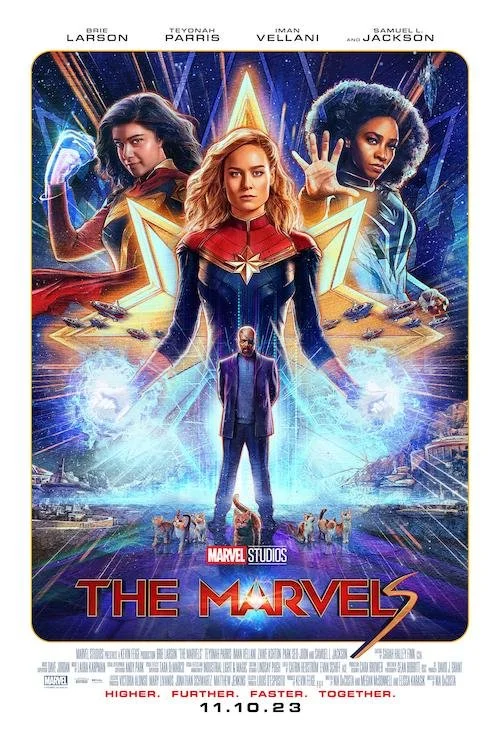The Marvels
Written by Andreas Babiolakis
It seems like eons ago when Captain Marvel was released. Marvel Studios was a mostly consistent company that never dipped below “pretty good”, and the vitriol that film garnered seemed unjust and pointed. Well, times have greatly changed since then. The Marvels is one of the better Marvel releases in recent memory (outside of Black Panther: Wakanda Forever), and even then it is mediocre. That’s because we’re still in this Marvel slump and the world is crushed by superhero fatigue; in a world, as divided and threatened as ours, there’s nothing “super”, especially after the umpteenth release that promises us that it’ll all be saved. Nonetheless, the reason why The Marvels is at least slightly better than its peers as of late is because Nia DaCosta seems to have tried to listen to customer feedback. Marvel films are too long? The Marvels is one hundred minutes. You need to have watched many films to understand just one feature? It’s still slightly true for The Marvels, but at least here we have a controlled story about three women of different generations and backgrounds teaming up like a comedy road film with action and galaxy hopping. DaCosta tried everything to make a film that could withstand the Marvel pitfall of phases four and five, but it still wasn’t quite enough for The Marvels to fully survive this black hole of exhaustion.
We continue the narrative path of Carol Danvers/Captain Marvel and, as a result, Monica Rambeau, but we are quickly acquainted with Kamala Khan who was given her own series Ms. Marvel last year. All three worlds collide here as all three women have their superpowers entwined with one another, and while this does lead to silly hijinks and some comic book film creativity, this feels more like a great opportunity for all three acting leads (Brie Larson as Danvers, Teyonah Parris as Rambeau, and Iman Vellani as Khan) to build some loveable comedic chemistry and camaraderie with each other. This reason and this reason alone makes The Marvels as watchable as it is. DaCosta takes what she has and makes a girl trip film where different values, problem-solving, and shared interests create a comfortable environment for these three actors to make their playground. It is during these moments that I actually was enjoying The Marvels quite a bit, especially when the chips were down and these three heroines had to count on one another to persevere.
The Marvels tries to be its own film, but it is bogged down just like nearly every other Marvel film as of late.
This is when you are quickly reminded that this is a Marvel film and it will be suffocated by the same tropes that we have been using for over a decade now. The same one-liners. The same reliance on action sequences. The same effects. I don’t have a problem with action or fun, but when you’re getting the exact same tone of all of these things for films on end, something’s got to give. I usually try to separate films from other works because I like to judge motion pictures as stand-alone releases, but it’s nearly impossible to do so with Marvel now when we have seen so many films before and didn’t know what we were in for when we started playing catch up at the start of this whole parade of monotony. It’s like trying to forget the joke your buddy has said a million times; the first time was a riot, and it made you laugh a few times more, but now you’re so fed up with the same joke and there’s no way you can ever find it amusing again. Not even if the funniest person on Earth told it this time.
The good news is The Marvels isn’t awful, which is more than I can say for films like Thor: Love and Thunder, for instance. It still feels held back by studio expectations and conventions, the same old narrative structures, and the over-reliance on preparing for what will come next in the Marvel canon. When this is a film about three women banding together to figure life and themselves out, it succeeds nicely. I know that even the action scenes involve this line of thinking as the three heroes team up, but these feel more like typical Marvel fighting sequences than they do problem-solving scenarios for this team. There are ways to make The Marvels’ scenes feel like its own. If what Lucrecia Martel revealed about the Marvel process still rings true (that directors are hired just for the “speaking” and character-building moments and that the studios handle all of the action sequences), this explains the dichotomy found here in The Marvels. What DaCosta brings to the film feels fresh enough and fun, but what is foisted upon the film by Marvel turns what could have been a better release into the same old bore. And so the Marvel downward spiral continues, even when honest efforts are given. At this point, it’s like being in an ice cream store with seventy different available flavours and being forced to keep eating scoops of Super Kid: it felt like a neat, fun, good idea at first, but now I’m just starving for something more substantial while I feel like I’m going to puke from being both overwhelmed and tired of the same taste every second. Please let us try other flavours, Marvel. Please. It’s 2023 now.
Andreas Babiolakis has a Masters degree in Film and Photography Preservation and Collections Management from Ryerson University, as well as a Bachelors degree in Cinema Studies from York University. His favourite times of year are the Criterion Collection flash sales and the annual Toronto International Film Festival.






